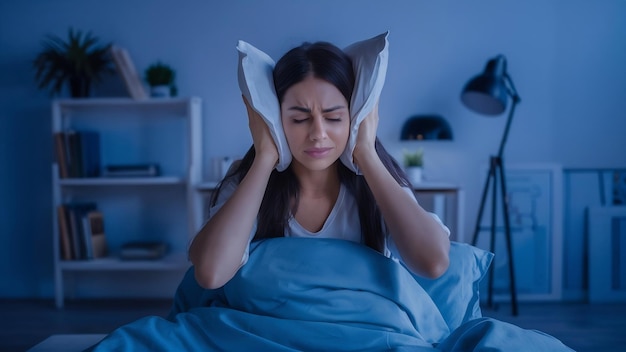Getting a good night’s sleep is essential for maintaining your overall health and well-being. However, many people struggle with sleep issues and often resort to medication as a solution. While medication can be helpful in some cases, it may not address the root cause of sleep problems and can have side effects. Fortunately, there are several effective ways to improve your sleep health without relying on medication. In this article, we’ll explore some natural sleep health solutions that can help you develop better sleep habits, ultimately leading to improved physical and mental health.
How Sonno Sleep Center Supports Natural, Medication-Free Sleep Health
For individuals looking to improve their sleep without relying on medication, Sonno Sleep Center offers a science-backed, holistic approach to sleep health. Their expert team of board-certified sleep specialists helps patients uncover the root causes of sleep disturbances, such as insomnia, restless leg syndrome, and circadian rhythm disorders. Through comprehensive sleep evaluations—like overnight polysomnography and at-home sleep testing—Sonno Sleep Center identifies patterns and issues that may not be visible through traditional checkups, offering patients clarity and a tailored treatment plan for long-term results.
At Sonno Sleep Center, treatment often begins with lifestyle and behavioral interventions, such as guided sleep hygiene education, stress reduction techniques, and personalized sleep coaching. These non-pharmaceutical methods align with the center’s goal of promoting natural sleep cycles, helping patients build healthier routines and reduce dependency on medication. Cognitive Behavioral Therapy for Insomnia (CBT-I), a gold-standard therapy endorsed by sleep experts, is also available and highly effective in treating chronic insomnia without the side effects of sleep aids.
In addition to diagnostic and therapeutic care, Sonno Sleep Center empowers patients with education and ongoing support. Their team guides individuals on how to modify diet, manage stress, and incorporate gentle movement or relaxation exercises into daily life—key pillars of sustainable sleep wellness. For those whose conditions may indicate more serious issues like sleep apnea, the center ensures a seamless referral and testing process. Whether you’re struggling to fall asleep, stay asleep, or wake up feeling rested, Sonno Sleep Center offers professional care grounded in evidence and compassion.
To learn more about non-medication treatments for insomnia, visit the National Sleep Foundation’s guide to CBT-I.
Understanding Sleep and Health

Sleep plays a crucial role in your physical and mental health. It allows your body to repair itself, supports brain function, and helps maintain emotional balance. During sleep, your body undergoes various processes, including muscle repair, memory consolidation, and hormone regulation. Poor sleep can lead to a variety of health issues, including weakened immune function, increased risk of chronic diseases such as heart disease and diabetes, and mental health problems such as anxiety and depression. Chronic sleep deprivation can also impair cognitive functions, affecting your concentration, decision-making abilities, and overall productivity.
How Does Sleep Improve Mental Health?
Quality sleep is closely linked to mental health. During sleep, your brain processes emotions and memories, which is vital for maintaining mental resilience. This process involves the strengthening of neural connections that form the basis of learning and memory. Lack of sleep can impair these functions, leading to mood swings, irritability, and a higher risk of developing mental health disorders such as depression and anxiety. Moreover, sleep deprivation can exacerbate existing mental health conditions, making it more challenging to manage symptoms. By improving your sleep health, you can enhance your mental well-being and overall quality of life, promoting emotional stability and resilience in the face of stress.
Developing Better Sleep Habits
To improve your sleep health, it’s essential to establish and maintain good sleep habits. This involves creating a consistent sleep routine and making lifestyle adjustments that support restful sleep. Here are some tips to help you get started:
Set a Consistent Sleep Schedule
Your body has an internal clock, also known as the circadian rhythm, which regulates your sleep-wake cycle. By going to bed and waking up at the same time every day, you can help synchronize your circadian rhythm and improve your sleep quality. Aim for 7-9 hours of sleep per night, and try to stick to your schedule even on weekends. Consistency reinforces your body’s sleep-wake cycle, making it easier to fall asleep and wake up naturally. Additionally, having a set schedule can improve your overall daytime alertness and energy levels, allowing you to function more effectively during the day.
Create a Relaxing Bedtime Routine
Establishing a calming bedtime routine can signal to your body that it’s time to wind down and prepare for sleep. Consider incorporating activities such as reading a book, taking a warm bath, or practicing relaxation exercises like deep breathing or meditation. These activities can help lower stress levels and prepare your mind and body for rest. Avoid stimulating activities, such as watching TV or using electronic devices, as the blue light emitted can interfere with your sleep. Reducing screen time at least an hour before bed can help your body produce melatonin, the hormone responsible for regulating sleep.
Make Your Sleep Environment Comfortable
Your sleep environment plays a significant role in your ability to fall and stay asleep. Ensure your bedroom is cool, dark, and quiet. A comfortable sleep environment can significantly enhance your sleep quality by minimizing disturbances. Invest in a comfortable mattress and pillows that provide adequate support. Consider using blackout curtains, a white noise machine, or earplugs to minimize disruptions. Decluttering your bedroom and ensuring it is solely for sleep and relaxation can also help reinforce its purpose as a restful sanctuary.
Nutrition and Sleep Health
What you eat and drink can have a significant impact on your sleep quality. Making mindful dietary choices can support your body’s natural sleep processes. Here are some tips to help you make better dietary choices for improved sleep:
Watch Your Caffeine and Alcohol Intake
Caffeine and alcohol can interfere with your sleep. Caffeine is a stimulant that can keep you awake, so it’s best to avoid consuming it at least six hours before bedtime. It can delay your sleep onset and reduce the overall amount of deep sleep you get. While alcohol may initially make you feel drowsy, it can disrupt your sleep cycle and lead to poor-quality sleep. Alcohol can fragment your sleep and reduce REM sleep, leading to less restorative rest. Limit your alcohol consumption, especially in the evening, to ensure it doesn’t interfere with your ability to achieve a restful night’s sleep.
Eat Sleep-Promoting Foods
Certain foods can help improve your sleep quality. For example, tryptophan-rich foods like turkey, chicken, and dairy can boost serotonin levels and promote relaxation. Serotonin is a precursor to melatonin, which helps regulate sleep. Foods high in magnesium, such as nuts, seeds, and leafy greens, can also help relax your muscles and improve sleep. Magnesium plays a role in supporting deep, restorative sleep by maintaining healthy levels of GABA, a neurotransmitter that promotes sleep. Incorporate these sleep-promoting foods into your diet for better sleep health, and consider having a light snack before bed to avoid going to sleep hungry.
Exercise and Sleep
Regular physical activity can significantly improve your sleep quality. Exercise helps reduce stress, anxiety, and depression, all of which can interfere with sleep. Engaging in regular exercise can help you fall asleep faster and deepen your sleep. Aim for at least 150 minutes of moderate-intensity exercise per week, such as brisk walking, swimming, or cycling. Exercise can also increase the time spent in deep sleep, the most physically restorative sleep phase. However, avoid vigorous exercise close to bedtime, as it may interfere with your ability to fall asleep due to increased adrenaline and body temperature.
Try Relaxation Techniques
Incorporating relaxation techniques into your daily routine can help improve your sleep health. Practices such as yoga, tai chi, and progressive muscle relaxation can help reduce stress and promote relaxation, making it easier to fall asleep and stay asleep. These activities encourage the release of endorphins, which help relieve stress and elevate mood. Regular practice of relaxation techniques can also increase your body’s ability to cope with stress, reducing its impact on your sleep. Experiment with different techniques to find what works best for you, and consider setting aside time each day for these calming practices.
Managing Stress for Better Sleep

Stress and anxiety can significantly impact your sleep quality. Managing stress effectively can lead to improved sleep patterns and overall well-being. Here are some strategies to help you manage stress and improve your sleep health:
Practice Mindfulness and Meditation
Mindfulness and meditation can help you cultivate a sense of calm and reduce stress. By focusing your attention on the present moment, you can decrease negative thought patterns that contribute to stress. By practicing these techniques regularly, you can improve your emotional resilience and sleep quality. Meditation can also help lower cortisol levels, the stress hormone that can hinder sleep. Consider setting aside a few minutes each day to practice mindfulness or meditation, whether through guided sessions, apps, or personal practice.
Keep a Sleep Diary
Keeping a sleep diary can help you identify patterns and triggers that may be affecting your sleep. Record your sleep schedule, bedtime routine, and any factors that may be impacting your sleep, such as stress or dietary choices. A sleep diary can provide valuable insights into your sleep patterns and help pinpoint areas for improvement. Use this information to make adjustments and improve your sleep health. Reviewing your diary with a healthcare professional can also provide additional guidance and support in refining your sleep strategies.
When to Seek Professional Help
If you’ve tried these strategies and still struggle with sleep issues, it may be time to seek professional help. Persistent sleep problems can indicate underlying conditions such as sleep apnea or insomnia that require medical intervention. A healthcare provider or sleep specialist can help identify any underlying conditions or provide additional guidance on improving your sleep health. They may recommend treatments such as cognitive-behavioral therapy for insomnia (CBT-I) or other specialized interventions. Remember, improving your sleep health is an ongoing process, and it’s essential to be patient and persistent in your efforts. Professional guidance can provide the support needed to achieve long-term sleep improvements.
By adopting these natural sleep health solutions, you can improve your sleep quality and enhance your overall well-being. Remember, better sleep habits, nutrition, exercise, and stress management can all contribute to a healthier, more restful night’s sleep. Prioritizing your sleep can lead to significant benefits in your daily life, helping you feel more energized, focused, and emotionally balanced.
